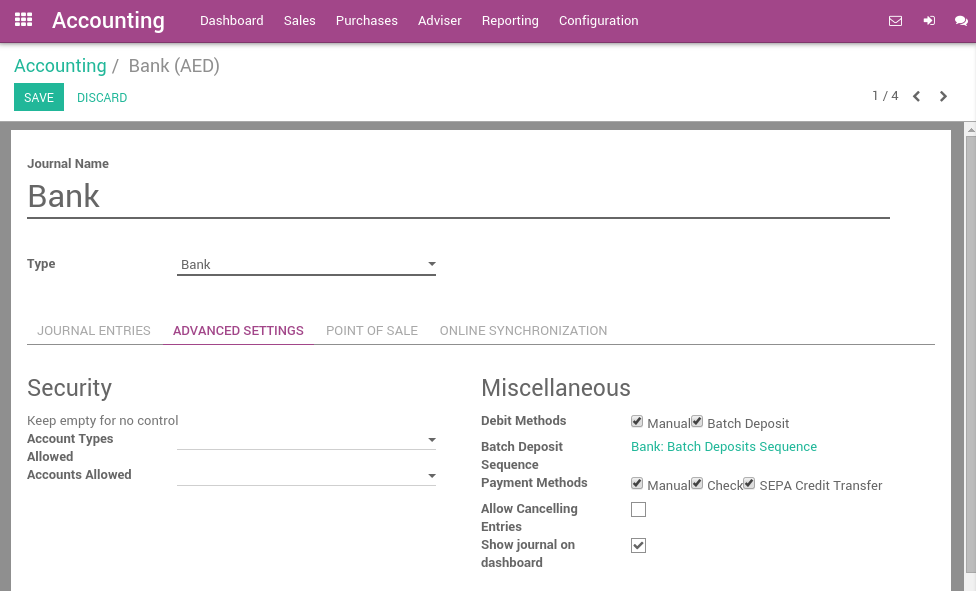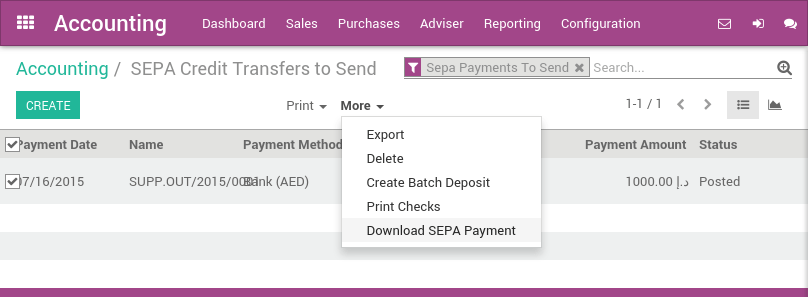SEPA, the Single Euro Payments Area, is a payment-integration initiative of the European union for simplification of bank transfers denominated in EURO. SEPA allows you to send payment orders to your bank to automate bank wire transfer.
SEPA is supported by the banks of the 28 EU member states as well as Iceland, Norway, Switzerland, Andorra, Monaco and San Marino.
With Odoo, once you decide to pay a vendor, you can select to pay the bill with SEPA. Then, at the end of the day, the manager can generate the SEPA file containing all bank wire transfers and send it to the bank. The file follows the SEPA Credit Transfer ‘PAIN.001.001.03’ specifications. This is a well-defined standard that makes consensus among banks.
Once the payments are processed by your bank, you can directly import the account statement inside Odoo. The bank reconciliation process will seamlessly match the SEPA orders you sent to your bank with actual bank statements.
Configuration
Install the required module
To pay suppliers with SEPA, you must install the SEPA Credit Transfer module. This module handle the process of generating SEPA files based on Odoo payments.
Note
According to your country and the chart of account you use, this module may be installed by default.
Activate SEPA payment methods on banks
In order to allow payments by SEPA, you must activate the payment method on related bank journals. From the accounting dashboard (the screen you get when you enter the accounting application), click on “More” on your bank account and select the “Settings” option.
To activate SEPA, click the Advanced Settings tab and, in the Payment Methods part of the Miscellaneous section, check the box Sepa Credit Transfer.
Make sure to specify the IBAN account number (domestic account number won’t work with SEPA) and the BIC (bank identifier code) on your bank journal.
Note
By default, the payments you send using SEPA will use your company name as initiating party name. This is what appears on the recipient’s bank statement in the payment from field. You can customize it in your company settings, in the tab Configuration, under the SEPA section.

Pay with SEPA
Register your payments
You can register a payment that is not related to a supplier bill. To do so, use the top menu . Register your payment and select a payment method by Sepa Credit Transfer.
If it’s the first time you pay this vendor, you will have to fill in the Recipient Bank Account field with, at least, the bank name, IBAN and BIC (Bank Identifier Code). Odoo will automatically verify the IBAN format.
For future payments to this vendor, Odoo will propose you automatically the bank accounts but you will be able to select another one or create a new one.
If you pay a specific supplier bill, put the reference of the bill in the memo field.

Once your payment is registered, don’t forget to Confirm it. You can also pay vendor bills from the bill directly using the Register Payment button on top of a vendor bill. The form is the same, but the payment is directly linked to the bill and will be automatically reconciled to it.
Generate SEPA files
From your accounting dashboard, you should see if there are SEPA files to generate for every bank account.

Click on the link to check all the payments that are ready to transfer via SEPA. Then, select all the payments you want to send (or check the top box to select all payment at once) and click on .

Troubleshooting
The bank refuses my SEPA file
Ask your bank if they support PAIN.001.001.03 SEPA Credit Transfers. If they don’t, or cannot provide relevant informations, please forward the error message to your Odoo partner.
There is no Bank Identifier Code recorded for bank account …
In order to send a SEPA payment, the recipient must be identified by a valid IBAN and BIC. If this message appear, you probably encoded an IBAN account for the partner you are paying but forgot to fill in the BIC field.
See also
